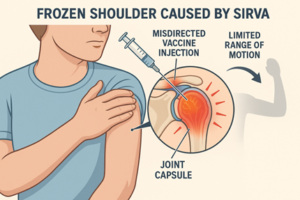
Most people associate flu or tetanus shots with minor, short-lived soreness in the shoulder and at the injection site. However, for a small number of individuals, the administration of a flu shot, tetanus shot, or other vaccine can lead to a much more serious shoulder injury called adhesive capsulitis, which is commonly referred to as frozen shoulder.
This condition can be painful, disabling, and costly to treat—especially when it results from an improperly administered vaccine. If you’ve developed shoulder stiffness and pain after a recent vaccination, you may be suffering from adhesive capsulitis or another condition that has legal and medical implications.
What Is Adhesive Capsulitis?
Adhesive capsulitis is a condition characterized by pain, stiffness, and restricted range of motion in the shoulder joint. The term frozen shoulder refers to the hallmark symptom of the condition: progressively limited movement in the shoulder joint. As the inflammation develops, the capsule of connective tissue around the shoulder joint thickens and tightens, essentially “freezing” the shoulder in place. This can make it incredibly difficult or even impossible to perform basic tasks like lifting your arm, reaching behind your back, or getting dressed.
Frozen shoulder typically develops in three stages consisting of the following:
- Freezing Stage – Gradual onset of pain and decreasing range of motion.
- Frozen Stage – Pain may lessen, but stiffness and immobility increase.
- Thawing Stage – Slow recovery of movement over time.
The entire cycle can last from several months to years, especially without treatment.
How Can a Flu or Tetanus Shot Cause Frozen Shoulder?
In rare cases, a routine intramuscular injection—such as a flu or tetanus vaccine—can be administered too high or too deep in the shoulder, accidentally penetrating the joint capsule or bursa instead of the deltoid muscle. This improper technique can trigger inflammation inside the joint, setting off a cascade of events that leads to adhesive capsulitis.

This type of injury is known as SIRVA (Shoulder Injury Related to Vaccine Administration), a recognized medical condition. SIRVA injuries are typically not caused by the vaccine itself, but by the way the shot is given and an error by the person administering the shot.
Symptoms to Watch For
If you recently received a vaccine and are experiencing the following symptoms, you may have adhesive capsulitis:
- Gradual onset of shoulder pain (especially within 48 hours of the injection)
- Increasing stiffness and difficulty moving the shoulder
- Pain that worsens at night or with shoulder activity
- Limited range of motion affecting daily activities (e.g., getting dressed, brushing hair, reaching above or behind, driving)
Legal and Financial Implications
Treatment for adhesive capsulitis may involve physical therapy, corticosteroid injections, and in some cases, surgery which typically consists of manipulation under anesthesia. This can result in lost wages, medical expenses, and long-term pain and suffering. Fortunately, individuals who suffer SIRVA injuries from vaccines like the flu or tetanus shot may be eligible to file a claim under the National Vaccine Injury Compensation Program (VICP)—a federal program that provides compensation to individuals injured by certain vaccines.
How an Attorney Can Help
If you’ve been diagnosed with adhesive capsulitis or frozen shoulder following a flu or tetanus shot, it’s important to speak with an experienced vaccine injury attorney. Navigating the VICP claims process requires detailed medical documentation, a clear understanding of the law, and strict filing deadlines.
At Cinelli Adoff LLP, we have the knowledge and experience to help you pursue compensation for medical costs, lost wages, and pain and suffering. There are no out-of-pocket attorney fees, as legal costs are covered by the VICP program.
Contact Us Today
If you believe you or a loved one may have developed adhesive capsulitis from a flu shot, tetanus shot, or other vaccine, don’t wait. Contact us for a free consultation and let us help you explore your legal options.

Leave a Reply
You must be logged in to post a comment.